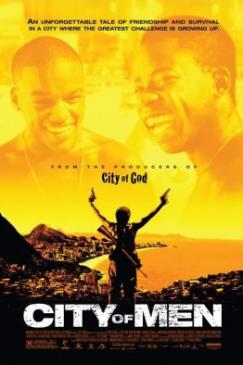CHICAGO – In anticipation of the scariest week of the year, HollywoodChicago.com launches its 2024 Movie Gifts series, which will suggest DVDs and collections for holiday giving.
Academy Award-Nominated ‘City of God’ Spawns Evocative Brazilian Slum Film ‘City of Men’
 CHICAGO – The plight of the people in the hard-hitting Brazilian film “City of Men” is akin with its plight to make you aware it even exists. This can be said about many great films that’ll touch you and leave you better than you were before despite not having the luxury of omnipresent advertising.
CHICAGO – The plight of the people in the hard-hitting Brazilian film “City of Men” is akin with its plight to make you aware it even exists. This can be said about many great films that’ll touch you and leave you better than you were before despite not having the luxury of omnipresent advertising.
For those of us fortunate enough to read this review or learn about “City of Men” in another way, you’d appreciate first soaking up its extraordinary evolution.
 Photo credit: IMDb |
The subtitled film, which opens in markets including Chicago on Friday, centers on the lives of best friends Acerola (Douglas Silva) and Laranjinha (Darlan Cunha) just before turning 18. They celebrate their birthdays not just because it’s another birthday but because it’s another year they’ve survived their hostile, gun-laden lives.
Digging deep into their pasts, they discover ghosts about their missing fathers that put the ultimate test on the solid friendship they thought they had. All the while, a war rages on between rival drug gangs from the favelas (slums) of Rio de Janeiro, Brazil.
The journey that ended in the film “City of Men,” though, actually began many years earlier with several predecessors. The film “City of Men” (“Cidade dos Homens” in Portuguese) spun off from the gripping television program by the same name from Kátia Lund and Fernando Meirelles. Watched by 35 million viewers in Brazil, the mini-series ran from 2002 to 2005.
 Photo credit: IMDb |
Its success – which Lund and Meirelles piggybacked off their own previous success with the Academy Award-nominated film “City of God” – propelled the creation of the feature-length film “City of Men”. Meirelles also directed “The Constant Gardener”. “City of Men” has the same producers as “City of God”.
History lesson aside, what many followers of the original film and then the TV series and now the new film don’t seem to know about is the very similar Brazilian favela film “Favela Rising” that was being documented smack dab in the middle.
That much lesser-known 2005 feature-length documentary trails a man who emerges from the same Rio de Janeiro slums to lead the non-violent cultural movement known as Afro-reggae.
“Favela Rising” director Jeff Zimbalist made his way to Chicago back in Feb. 2007, screened the film for Chicagoans way off the typical film-screening path and spoke with HollywoodChicago.com film critic Adam Fendelman. That full audio interview can be listened to here.
 Photo credit: IMDb |
Likewise, the new “City of Men” film depicts the reality that these people are being raised – and often raise themselves – in one of the most volatile communities in the world.
The opening sequence nervously illustrates what’s necessary to carry out the simple desire of swimming on the beach on a scorching day: an entourage of heavily armed guards stationed at calculated posts.
When you stroll leisurely into your safe Chicago movie theater from an anodyne Michigan Avenue without a care in the world except perhaps what you have to accomplish tomorrow in your industrious life, it’s enough to make you feel fortunate providence that you’re living like a king.
In Rio de Janeiro, on the other hand, these thick-skinned people find sanctuary in merely surviving another day and are forced to saunter about in daily dread of randomly being slaughtered.
 Photo credit: IMDb |
While the film makes you rightfully queasy with excellently effective doses of reality, though, it spends the entirety of its 110 minutes on character and story development without delving deep enough into the intricate details.
From the “Favela Rising” experience, you’re better enveloped in the signs, symbols, secrets, traditions and underlying meanings of their everyday lives and how they all help to result in survival and even happiness.
Though conversation with members of the Brazilian Consulate General in Chicago who were seated next to me reminded me that the act of setting off fireworks depicts a warning that police are en route, you wouldn’t have known that from the film. Also, why is it so important to these people to “take their hills” in such a fierce exercise of deadly capture the flag?
I shouldn’t have had to be sitting next to natives of the country to learn the critical cultural intricacies the film should have conveyed. That knock aside, it’s entirely healthy – and often necessary in our prosperous lives – to be reminded of our good fortune while being educated about those without it.
 | By ADAM FENDELMAN |


